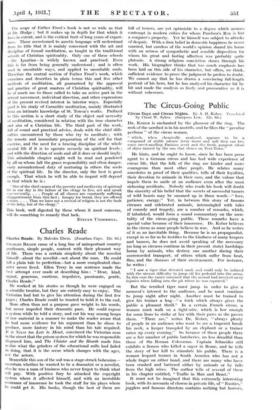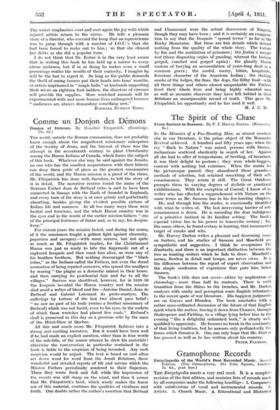The Circus-Going Public
Circus Days and Circus Nights. By A. H. Kober. Translated by Claud W. Sykes. (Sampson Low. 12s. 6d.) DR. KOBER is enchanted by the glamour of the ring. The
reek of the sawdust is in his nostrils, and he likes the " peculiar perfume " of the circus women,
which, when chemically analysed, appears to ho a compound of stable odours (very warns and soft they can be), some sweat-smelling Parisian scent and the fresh, pungent odour of skins tanned by the sun that shines on Tent-Town."
He hints, and he ought to know, since he has been press agent to a German circus and has had wide experience of circus life, that the folk of the ring are kinder and more courageous than most other people. He relates many anecdotes in proof of their qualities, tells of their loyalties, their devotion to animals in their care, and the valour that impels them to smile at an audience even after the most sickening accidents. Nobody who reads his book will doubt the sincerity of his belief that the secrets of successful tamers of wild beasts may be summed up in three words—" love, patience, energy." Yet, in between this story of famous circuses and celebrated animals, intermingled with tales of comedy and tragedy, are a number of remarks, which, if tabulated, would form a sound commentary on the men- tality of the circus-going public. These remarks have a special value because of their innocence. Dr. Kober believes in the circus as some people believe in war. And so he writes of it as an inevitable thing. Because he is no propagandist, except in so far as he testifies to the kindness of many keepers and tamers, he does not avoid speaking of the necessary (so long as circuses continue in their present state) hardships borne by animals, who destroy one another during their overcrowded transport, of others which suffer from heat, flies, and the diseases of their environment. For instance, he writes :
" I saw a tiger that detested sand, and could only be induced with the utmost difficulty to jump off his pedestal into the arena. In this case the tamer surmised that the animal had received nasty injuries when falling into the pit whore he was captured."
But the terrified tiger must jump in order to give a
moment's interest to the audience, and he must continue to jump night after night. Another must be trained to give his trainer a hug—" a trick which always gives the
public a pleasant thrill." In a certain French circus, a woman must walk on a tight-wire, which is low enough for some lions to strike at her with their paws as she passes them. " There are," writes Dr. Kober, " always plenty of people in an audience who want to see a trapezist break his neck, a keeper trampled by an elephant or a trainer eaten up every evening." So because of these people there are a fair number of public butcheries, no less dreadful than those of the Roman Colosseum. Captain Schneider still exhibits a lioness who killed a super in Rome, and he tells the story of her kill to stimulate his public. There is a woman leopard trainer in South America who has not a whole finger on either hand, and there are many who have been crushed and battered either by animals or by falls from the high wires. The author tells of several of these in his chapter entitled, " Traffic in Man and Beast."
It must not be imagined that this extremely interesting book, with its accounts of clowns in private life, of " Exotics," jugglers and famous directors contains nothing but horrors, The writer emphasizes over and over again the joy with which injured artists return to the circus. He tells a pleasant story of a director, who covered the hoop that an equestrienne was to jump through with a number of I.O.U.'s that she had been forced to make out to him ; so that she cleared her debts as she did a popular turn.
I do not think that Dr. Kober is in the very least aware that in writing this book he has held up a mirror to every circus audience, but if in so doing he makes even a small percentage realize the results of their curiosity, I imagine he will be the last to regret it. So long as the public demands the thrill of seeing tamers put their heads into lions' mouths, or artists imprisoned in " magic halls," or husbands supporting their wives on eighteen foot ladders, the directors of circuses will provide the supplies. More wretched animals will be experimented with and more human lives endangered because " audiences are always demanding something new."
BARBARA EUPIIAN TODD.









































 Previous page
Previous page